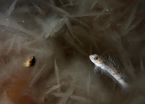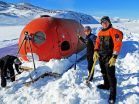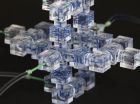(Press-News.org) CHAMPAIGN, Ill. — Antarctic fishes that manufacture their own "antifreeze" proteins to survive in the icy Southern Ocean also suffer an unfortunate side effect, researchers report: The protein-bound ice crystals that accumulate inside their bodies resist melting even when temperatures warm.
The finding is reported in the Proceedings of the National Academy of Sciences.
"We discovered what appears to be an undesirable consequence of the evolution of antifreeze proteins in Antarctic notothenioid fishes," said University of Oregon doctoral student Paul Cziko, who led the research with University of Illinois animal biology professors Chi-Hing "Christina" Cheng and Arthur DeVries. "What we found is that the antifreeze proteins also stop internal ice crystals from melting. That is, they are anti-melt proteins as well."
Five families of notothenioid fishes inhabit the Southern Ocean, the frigid sea that encircles Antarctica. Their ability to live in the icy seawater is so extraordinary that they make up more than 90 percent of the fish biomass of the region.
DeVries discovered antifreeze proteins in Antarctic notothenioid fishes in the late 1960s, and was the first to describe how the proteins bind to ice crystals in the blood to prevent the fishes from freezing.
In the new study, the team investigated whether the antifreeze protein-bound ice crystals inside these fishes would melt as expected when temperatures warmed. When researchers warmed the fishes to temperatures above the expected melting point, some internal ice crystals failed to melt. Ice that doesn't melt at its normal melting point is referred to as "superheated."
The researchers also found ice crystals in wild notothenioid fishes swimming in relatively warmer Antarctic summer waters, at temperatures where they would be expected to be free of ice. By testing the antifreeze proteins in the lab, the team found that these proteins also were responsible for preventing the internal ice crystals from melting.
"Our discovery may be the first example of ice superheating in nature," Cheng said.
A diver himself, Cziko worked with other divers to place and maintain a temperature-logging device in McMurdo Sound, Antarctica, one of the coldest marine environments on the planet. The device recorded ocean temperatures there for 11 years, a substantial portion of notothenioids' lifespan. Not once in that time did temperatures increase enough to overcome the antifreeze proteins' anti-melting effect to completely rid the fishes of their internal ice, the researchers report.
The researchers suspect that the accumulation of ice inside the fishes could have adverse physiological consequences, but none have yet been discovered.
If the fishes are destined to carry ice crystals around all their lives, Cheng said, it is conceivable that ice particles could obstruct small capillaries or trigger undesired inflammatory responses. Cziko likens the potential threat to dangers posed by asbestos in the lungs or blood clots in the brain.
"Since much of the ice accumulates in the fishes' spleens, we think there may be a mechanism to clear the ice from the circulation," he said.
"This is just one more piece in the puzzle of how notothenioids came to dominate the ocean around Antarctica," he said. "It also tells us something about evolution. That is, adaptation is a story of trade-offs and compromise. Every good evolutionary innovation probably comes with some bad, unintended effects."
The long-term temperature record of McMurdo Sound produced in the study also "will prove to be of great importance and utility to the polar research community that is addressing organismal responses to climate change in this coldest of all marine environments," Cheng said.
INFORMATION:
Clive W. Evans, a professor of molecular genetics and development at the University of Auckland in New Zealand, also is a co-author of the new paper.
The National Science Foundation supported this research.
Editor's notes:
To reach Christina Cheng, email c-cheng@illinois.edu
To reach Paul Cziko, call 217-819-7976; email pcziko@uoregon.edu
The paper, "Antifreeze protein-induced superheating of ice inside Antarctic notothenioid fishes inhibits melting during summer warming," is available to members of the media from the U. of I. News Bureau.
Links to additional materials:
Paul Cziko's website with photos of fishes and Antarctic research
Background slideshow with narration featuring Dr. Christina Cheng
Study: Antifreeze proteins in Antarctic fishes prevent freezing…and melting
2014-09-22
ELSE PRESS RELEASES FROM THIS DATE:
Healthy lifestyle choices may dramatically reduce risk of heart attack in men
2014-09-22
WASHINGTON (Sept. 22, 2014) — Following a healthy lifestyle, including maintaining a healthy weight and diet, exercise, not smoking and moderating alcohol intake, could prevent four out of five coronary events in men, according to a new study publishing today in the Journal of the American College of Cardiology.
While mortality from heart disease has declined in recent decades, with much of the reduction attributed to medical therapies, the authors said prevention through a healthy lifestyle avoids potential side effects of medication and is more cost effective for population-wide ...
Immune response turned up, not down, by flu during pregnancy, Stanford/Packard study finds
2014-09-22
Pregnant women have an unusually strong immune response to influenza, an unexpected finding that may explain why they get sicker from the flu than other healthy adults, new research from the Stanford University School of Medicine and Lucile Packard Children's Hospital Stanford has found.
The results were surprising because immune responses are thought to be weakened by pregnancy to prevent the woman's body from rejecting her fetus.
The study, which will be published online Sept. 22 in the Proceedings of the National Academy of Sciences, is the first to examine the ...
Firelight talk of the Kalahari Bushmen
2014-09-22
SALT LAKE CITY, Sept. 22, 2014 – After human ancestors controlled fire 400,000 to 1 million years ago, flames not only let them cook food and fend off predators, but also extended their day.
A University of Utah study of Africa's Kalahari Bushmen suggests that stories told over firelight helped human culture and thought evolve by reinforcing social traditions, promoting harmony and equality, and sparking the imagination to envision a broad sense of community, both with distant people and the spirit world.
Researchers previously studied how cooking affected diets and ...
University of Utah engineers unlock potential for faster computing
2014-09-22
SALT LAKE CITY, Sept. 22, 2014 – University of Utah engineers discovered a way to create a special material – a metal layer on top of a silicon semiconductor – that could lead to cost-effective, superfast computers that perform lightning-fast calculations but don't overheat.
This new "topological insulator" behaves like an insulator on the inside but conducts electricity on the outside and may pave the way for quantum computers and fast spintronic devices.
The research, led by University of Utah materials science and engineering professor Feng Liu, was published today ...
Lego-like modular components make building 3-D 'labs-on-a-chip' a snap
2014-09-22
Thanks to new LEGO®-like components developed by researchers at the USC Viterbi School of Engineering, it is now possible to build a 3-D microfluidic system quickly and cheaply by simply snapping together small modules by hand.
Microfluidic systems are used in many fields including engineering, chemistry and biotechnology to precisely manipulate small volumes of fluids for use in applications such as enzymatic or DNA analysis, pathogen detection, clinical diagnostic testing, and synthetic chemistry. Traditionally, microfluidic devices are built in a cleanroom on a two-dimensional ...
Platelets modulate clotting behavior by 'feeling' their surroundings
2014-09-22
Platelets, the tiny cell fragments whose job it is to stop bleeding, are very simple. They don't have a cell nucleus. But they can "feel" the physical environment around them, researchers at Emory and Georgia Tech have discovered.
Platelets respond to surfaces with greater stiffness by increasing their stickiness, the degree to which they "turn on" other platelets and other components of the clotting system, the researchers found.
"Platelets are smarter than we give them credit for, in that they are able to sense the physical characteristics of their environment and ...
Genetic switch regulates a plant's internal clock based on temperature
2014-09-22
Scientists have discovered a key molecular cog in a plant's biological clock – one that modulates the speed of circadian (daily) rhythms based on temperature.
Transcription factors, or genetic switches, drive gene expression in plants based on external stresses – such as light, rain, soil quality, or even animals grazing on them. A team of researchers at USC has isolated one, called FBH1, that reacts to temperature – tweaking the rhythm here and there as needed while in keeping it on a consistent track.
"Temperature helps keep the hands of the biological clock in the ...
Massachusetts General study reveals gene expression patterns in pancreatic CTCs
2014-09-22
Analysis of circulating tumor cells (CTCs) in a mouse model of pancreatic cancer identified distinct patterns of gene expression in several groups of CTCs, including significant differences from the primary tumor that may contribute to the ability to generate metastases. In their study reported in the Sept. 25 issue of Cell Reports, investigators from the Massachusetts General Hospital (MGH) Cancer Center identified several different classes of pancreatic CTCs and found unexpected factors that may prove to be targets for improved treatment of the deadly tumor.
"Our ...
Infant solar system shows signs of windy weather
2014-09-22
Astronomers using the Atacama Large Millimeter/submillimeter Array (ALMA) have observed what may be the first-ever signs of windy weather around a T Tauri star, an infant analog of our own Sun. This may help explain why some T Tauri stars have disks that glow weirdly in infrared light while others shine in a more expected fashion.
T Tauri stars are the infant versions of stars like our Sun. They are relatively normal, medium-size stars that are surrounded by the raw materials to build both rocky and gaseous planets. Though nearly invisible in optical light, these disks ...
Old drug may be key to new antibiotics
2014-09-22
Hamilton, ON (September 22, 2014) – McMaster scientists have found that an anticonvulsant drug may help in developing a new class of antibiotics.
Although dozens of antibiotics target what bacteria do, their study has looked at how a certain part of bacteria are created, and they found there is a way of stopping it.
The discovery is important as there is growing concern worldwide about how antibiotic resistance is making the cures for infections ineffective. The World Health Organization has declared that antibiotic resistance is a major threat to global health security. ...








